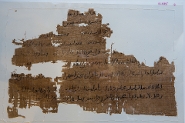
Papyri: the written residue of daily life during the formative period of Islam
How did people experience Islam on a day-to-day basis in the early centuries of Islam? That's where the papyri come in, says professor of Arabic Petra Sijpesteijn in the fourth video of the Leiden | Islam interview series.
Papyri are the only contemporary written material from the formative period of Islam (7th-9th century CE). In this video, Petra Sijpesteijn explains why they are so important as documents that record every aspect of daily life and reflect many levels of society, revealing the diversity of the early Islamic world.

"They are the written residue of daily life," she says in the interview. As a researcher, they give her immediate access to people’s concerns and occupations in a world that we don’t otherwise have access to. As such, they provide an incredibly valuable source in addition to the books that were produced in the Muslim world two centuries later.
Petra Sijpesteijn
Petra Sijpesteijn is professor of Arabic at Leiden University. Her research concentrates on recovering the experiences of Muslims and non-Muslims living under Islamic rule, using the vast stores of radically under-used documents surviving from the early Islamic world.
Leiden | Islam interview series
This is the fourth video in the Leiden | Islam interview series, which contains short documentary-style videos including interview flashes with leading scholars in the field of Islam and Muslim societies. With this series, LUCIS (Leiden University Centre for the Study of Islam and Society) aims to show the value of unconventional insights related to Islam and Muslim societies.
In the first video of the series, James Montgomery explained the relevance of Arabic poetry for our understanding of the Arabic-speaking world. In the second video, Michael Macdonald explained the relevance of uncovering the thousands of inscriptions of ancient Arabia. In the third video, Driss Moussaoui, a Moroccan psychiatrist, explained why it is important for psychiatrists to be sensitive to their patients' religious beliefs.
The videos in this series are produced by Faithful to the Subject. The production of this series is made possible by a donation of Aramco, a Saudi Arabian oil company.


